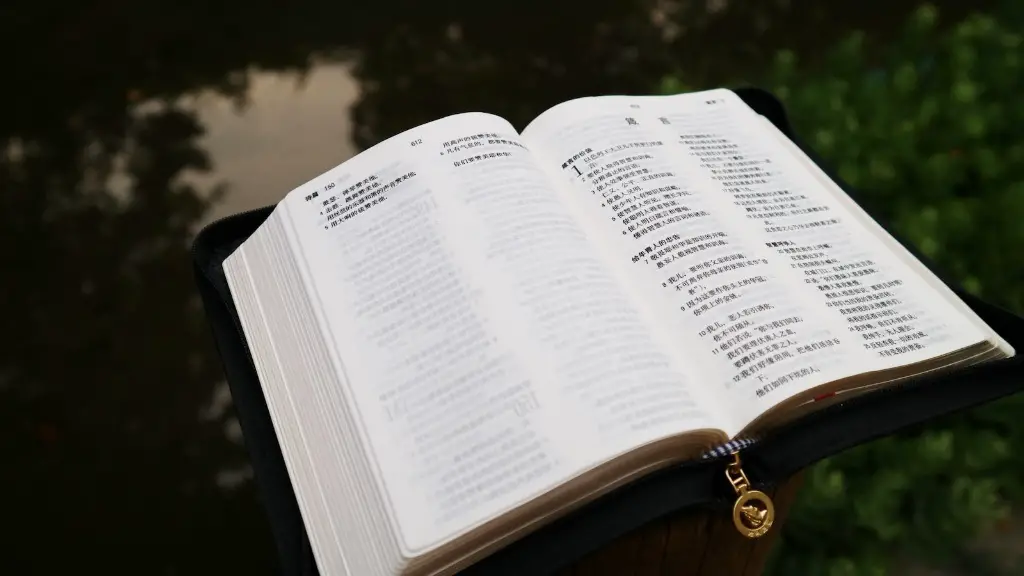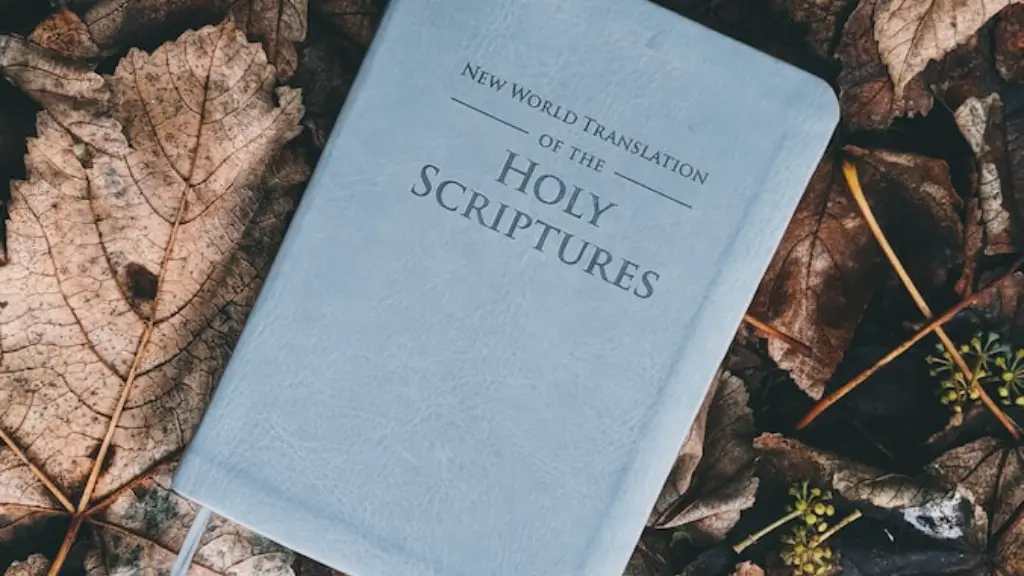The name Melchizedek is mentioned in the Bible only two or three times, and while the meaning of the name and the identity of Melchizedek have been the source of much debate and controversy, it is clear that this mysterious figure played an important part in the early biblical narrative and could even be seen as a proto-type of Jesus himself. In the Bible, Melchizedek is referred to as a ‘king of righteousness’ (Hebrews 7:2), who is believed to have been a mysterious king of Salem (modern day Jerusalem). According to Genesis 14:18-20, Melchizedek is said to have brought forth bread and wine to bless and provide sustenance for Abraham and his men, during a time when Abraham was returning home after a long and victorious campaign against five enemy Kings. In addition, Melchizedek is also mentioned in Psalm 110:4 when the Psalmist says: “The Lord hath sworn, and will not repent; Thou art a priest forever after the order of Melchizedek.”
The significance of Melchizedek has been closely debated throughout the years. There are two main interpretations of Melchizedek’s role in the Bible. The first interpretation is that Melchizedek was a mysterious priest-king who held the highest spiritual office and authority in the region at the time in which he was mentioned. In other words, many believe that Melchizedek was a type of “messiah” figure, a pre-cursor to Jesus who, in a sense, prefigured the elements of Jesus’s later priestly ministry.
The second interpretation is that Melchizedek was none other than an angelic being who was sent by God to bless Abraham and his men. This interpretation is based on Psalm 110:4 which says “Thou art a priest forever after the order of Melchizedek.” The fact that the scriptures describe Melchizedek as a priest “after the order of Melchizedek” could suggest that he was a heavenly but not human being.
Although some scholars may debate about the significance of Melchizedek’s role in the Bible, one thing is for sure: the mention of Melchizedek is significant for several reasons. Firstly, it demonstrates God’s larger plan for redemption through symbolism and foreshadowing of Jesus’s later priestly ministry. Secondly, Melchizedek being a king of righteousness signals a shift of monarchy from an earthly kingdom to a true spiritual kingdom. Lastly, the blessing of bread and wine implies an anticipation of the sacrament of Communion, which Christ would later institute in his last supper.
Significance of Melchizedek’s Priesthood
The priesthood of Melchizedek is mentioned in Hebrews 7, with the writer of Hebrews affirming that the same priesthood to which Jesus Christ belongs is also shared by Melchizedek. This reference to the mysterious king of Salem invites us as readers to consider who this figure could be and why his priesthood is affirmed as higher and more sovereign than that of the Levitical priesthood.
The mystery of Melchizedek’s priesthood is deepened when we consider that Melchizedek’s priesthood is considered to be “without father, without mother, without genealogy” and that Melchizedek himself is said to “abide a priest continually” lessening the importance of Jesus’ genealogy to the priesthood as well. This is significant because as Jesus assumes the priestly duties, he does so as a perfect and sinless High Priest with all believers “…having been made perfect,” says Hebrews 7:28, “He became the source of eternal salvation to all who obey him.”
The writer of Hebrews is also careful to point out that the priestly order of Melchizedek is higher than Aaronic priesthood. According to verses 8-10 of Hebrews, “Now hereanother thing was added. Even though Melchizedek was not from the tribe of Levi, he was given much greater honour than those from that tribe. The name of the priest (Levi) who blessed Abraham was Levi. But the name of the priest (Melchizedek) who blessed him was greater.” These verses clearly illustrate that Melchizedek’s priesthood is of a higher order than that of the Levites.
Prophetic Significance of Melchizedek
In addition to the significance of Melchizedek’s priesthood, the figure of Melchizedek may also serve as a prophetic figure. As the king of Salem, and a priest of the Most High God, it is possible that Melchizedek was inviting Abraham to a future priesthood where there was no need for a particular tribe or lineage for participation. In other words, Melchizedek’s priesthood is offering a prophetic promise in that it anticipates the messianic priesthood of Jesus as well as the priesthood of all believers.
This prophetic significance of Melchizedek is further highlighted in Psalm 110:4, where the psalmist states: “The lord hath sworn, and will not repent; Thou art a priest forever after the order of Melchizedek.” According to Jewish commentators, when the word ‘priest’ is used in reference to Melchizedek, it may also refer to the coming of a messianic figure.
What is even more interesting is that the words ‘king’ and ‘priest’ often appear in reference to Christ throughout the New Testament. The fact that the New Testament authors draw on the passage in Psalm 110 to describe the Lord Jesus Christ as both ‘king’ and ‘priest’ could suggest that the mysterious priest-king of Salem holds a title that goes beyond this temporal world and into eternity itself, as we as believers look forward to Christ’s future reign as ‘king’ and ‘priest’.
Implications of Melchizedek’s Blessing
The blessing of Abraham by Melchizedek is significant for several reasons. Firstly, it indicates a recognition of Abraham’s extraordinary leadership and faith in God. Secondly, the blessing serves as an act of God’s divine favour towards Abraham and his people. Thirdly, the blessing serves as a prophetic foreshadowing of Jesus’s later work as a priest, in that it anticipates that Jesus would bring forth bread and wine as a blessing to mankind.
Additionally, it is also noteworthy that the blessing was made upon Abraham and his seed. This is significant in that it provides a clear link between Abraham and the promised Messiah. As the New Testament authors affirm that Jesus Christ is the son of Abraham, the blessing of Abraham could provide a prophetic foreshadowing of Christ’s work as a servant- king to the nations.
Symbolism of Bread and Wine
The reference to Melchizedek bringing forth bread and wine has also garnered much discussion and debate amongst bible scholars and theologians. Some believe that the bread and wine offered by Melchizedek provides an important prophetic detail regarding the nature of Jesus’s ministry and his later institution of the sacrament of Holy Communion. As Jesus institutes the sacrament of Holy Communion with the words “This is my body; this is my blood”, the reference to Melchizedek offering bread and wine could serve as a prophetic foreshadowing of the Eucharistic sacrifice that Jesus would make for mankind.
Others note that the background of the offering of bread and wine could also be related to the sacrificial system, wherein the offering of bread and wine were offerings of thanksgiving, whereby a sacrifice was offered to God in exchange for His blessings. This could symbolise the ultimate offering of gratitude to God, which would be made by Jesus Christ himself, through his ultimate sacrifice on the cross and in doing so, blessing all of creation.
Implications for Believers
Regardless of the various interpretations of Melchizedek, one thing is for sure: the mention of Melchizedek carries with it significant implications for believers today. Firstly, it serves as a reminder of the prophetic promises that God has made to His people, to which believers today can look to as a source of comfort and assurance in difficult times. Secondly, the story of Melchizedek provides a vivid reminder of the special mission and vocation that God has conferred on humankind- that of faithful priest, who models faithfulness and trust in God and obedience to His will. Lastly, the biblical portrayal of Melchizedek may also act as an encouragement to believers by reminding us of the mysterious and sometimes unobvious ways in which God works in our lives.
The Hope of Salvation
The mention of the mysterious Melchizedek in the Bible is ultimately a reminder of God’s larger plan for redemption and of a hope-filled future, where eventually, all of creation will be restored to the love and peace of God. In this sense, the biblical allusions of Melchizedek’s priestly role as well as the symbolism of bread and wine can provide a sense of assurance for believers, in that ultimately all of creation will be reconciled to God and to each other, through Christ’s atoning work.
In this way, the essence of the Melchizedek narrative- that of hope and reassurance- is evident even today, as believers can look to the mysterious figure of the priest-king as a type of Christ figure pointing forward to Jesus’s priestly ministry, and ultimately pointing to a salvation which can be found in Christ alone.
Conclusion of Abraham’s Sacrifice
Finally, the story of Melchizedek also serves as an example of Abraham’s obedience to God. Abraham could have simply lived a comfortable life, enjoying the blessings of Abrahamic Covenant but instead, Abraham accepted God’s challenge, leaving his home and embarking on an arduous journey of faith which he knew had eternal ramifications.
The story of Abraham, Melchizedek and the offering of bread and wine serve to remind us as fellow believers, that faithfulness is more than simply believing in certain doctrines, rather, it is about trusting and following God’s will in every area of our lives- knowing that in due time, He will work out all things according to his good pleasure.





